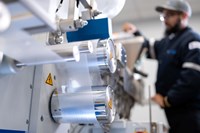Painting Q&A: Decreasing Energy Usage in Paint Lines
How to decrease energy use.
Painting Q&A: Decreasing Energy Usage in Paint Lines
Q. Is there a way for our shop to decrease energy use on our paint line?
A. Operating a finishing line has always been a balancing act. One tip of the labor, materials and equipment scale, and the entire operation can fall off track. Add energy conservation and sustainability to that scale, and finishers have an even bigger juggling act.
Although energy use is just one component of the finishing equation, it does have the ability to affect overall production costs. When executed efficiently, it can provide real cost savings. While materials and labor can cause a more immediate cost impact, decreasing energy use on a paint line is becoming top of mind for finishers—especially because sustainability and energy conservation are increasingly important to both OEMs and tier suppliers.
There are multiple ways to decrease energy use on a finish line, but if the ultimate goal is to decrease energy use while also saving on operational costs, the best thing to do is minimize line operation time.
Two key clichés to consider here: “Do it right the first time” and “time is money.” If both principles are applied while operating a finishing line, overall energy and reprocessing costs can be controlled. High density racking and proper scheduling will help eliminate rework, which can save a finisher thousands of dollars in energy costs over the course of a year.
“Do it right the first time.” Coating as many parts as possible, as quickly as possible, without compromising application quality is key to operating any line efficiently. However, reprocessing parts that were improperly coated during the first pass causes an increase in energy use and cost. Conducting routine equipment maintenance will help ensure application accuracy and proper film thickness.
“Time is money.” No phase should sit, as idle time leads to money lost, but no phase should be overburdened. Proper scheduling is crucial to decreasing energy use on a paint line, and just as importantly, providing a safe workplace. Overworking operators and ignoring the ergonomics of the line is not a recipe for success. Proper scheduling considers every position on the line.
While production out-the-door may lead to faster profits, a thorough audit of all components on a finishing line is undoubtedly a wise investment. Every minute spent correcting an error is an expense, but every minute spared operating the line can result in overall production savings.
Originally published in the September 2015 issue.
Related Content
-
Chicago-Based Anodizer Doubles Capacity, Enhancing Technology
Chicago Anodizing Company recently completed a major renovation, increasing its capacity for hardcoat anodizing and Type II anodizing.
-
FABTECH 2024 Heads to Orlando
CCAI’s FINISHING Pavilion and Conference continues to grow at FABTECH, offering insights and innovations covering all aspects of industrial surface finishing.
-
CFS Unveils New Hook Locks Parts Racking Solution
New product from Custom Fabricating & Supplies (CFS) prevents part loss during coating processes.















